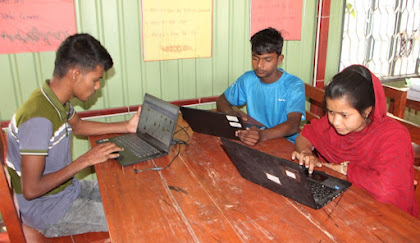Learning Coding Remotely: Impacting Lives
In early 2025, girls from some of the most remote areas of Bangladesh gained an unprecedented opportunity to learn coding through the ‘Coding for Kids’ program. This initiative, funded by the Bangladeshi NGO Friendship and supported technically by Dreamers Academy, is equipping young learners with digital skills that could change their futures.
The Dhaka Tribune published a report on March 18, 2025 (https://www.dhakatribune.com/bangladesh/development/376083/breaking-barriers-girls-from-bangladesh%E2%80%99s-remote). As a proud supporter of this initiative, I am honored to have played a role in encouraging Friendship and Dreamers Academy to launch this program. In this blog post, I am sharing some insights along with the report.
In 19 districts of Bangladesh, there are isolated char islands where educational resources are scarce, and awareness levels are low. This coding initiative is breaking barriers by providing children—both boys and girls, aged 7-16—with access to essential digital literacy. Launched in February 2025, the program has enrolled 44 students from various locations, offering them a chance to develop skills in coding and programming. To understand the remoteness of char islands, some can be up to 2-3 hours away from the mainland, requiring multiple forms of transport.
This initiative is particularly significant for climate-affected communities, where frequent displacement, poverty, and social norms often force girls to drop out of school. Many guardians prioritize sending their sons to work on farms or arrange early marriages for their daughters, which is dangerous. By integrating 21st-century skills into education, Friendship is ensuring that these young learners can continue their studies while preparing for careers in the global digital economy.
Currently, 21 girls from 16 Friendship secondary schools are participating in the program. Highlighting its impact, Friendship’s Founder and Executive Director, Runa Khan, said: “When a girl learns to code, she is not just writing commands for a computer—she is rewriting her future.” Although the number of participants is still small, it’s a significant step. Initially, I thought they might only find 10 students, but 44 is a better outcome than expected. I’m confident this will create a strong use case that can be scaled to other locations in Bangladesh, and will serve as a proven model for fundraising to support more kids.
The coding program is a long-term investment, set to run until 2027, covering courses in Scratch, Python, and automation, ultimately leading to freelancing opportunities. The boys and girls are enthusiastic about learning. When I asked a few of them if they think it's beneficial, they said, “Of course, this is a rare opportunity, and we will not miss it. We will capitalize on it.”
Beyond learning, the initiative aims to provide tangible career pathways. Upon completing the program, Friendship and Dreamers Academy will help students secure freelancing work, remote job placements, and internships, ensuring their new skills lead to economic independence.
Ashfaq Zaman, co-founder of Dreamers Academy, emphasized the transformative potential of technology: “Unlike traditional livelihoods, tech skills can be used anywhere. A girl from a char can become a global freelancer, a remote developer, or even start her own online business. That’s why we started this initiative—to turn their vulnerability into an opportunity. In the long run, we hope to build a more inclusive digital economy where talent, not location or gender, determines success.”
As this initiative progresses, it is proving that talent knows no boundaries. With the right opportunities, even the most marginalized girls in Bangladesh’s remote char regions can step into the digital world, compete globally, and break the cycle of poverty through technology.




Comments
Post a Comment